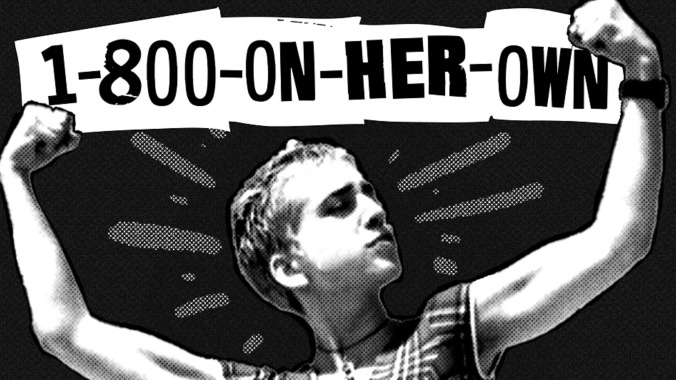In 1-800-On-Her-Own, Ani DiFranco Takes a Rare Look Backward to Move Forward
We spoke with director Dana Flor, MUNA’s Katie Gavin and DiFranco herself about the brand new documentary, which recently made its debut at Tribeca Film Festival.

Sometime before the world plunged into pandemic, documentary filmmaker Dana Flor met prolific singer, songwriter and activist Ani DiFranco before a gig in Woodstock. They went for a walk through the woods near the venue and, by Flor’s recollection, immediately bonded—so much so, in fact, that the fast friends completely lost track of time. Ultimately, DiFranco missed a cue from her panic-stricken team, prompting them to launch a search for her. “Her tour manager was like, ‘Where the fuck is Ani?’” Flor recalled with a laugh in a recent Zoom interview with Paste. “We had such an affinity for one another. She’s really foul-mouthed, she’s really smart and she’s so dynamic.”
The need to make a film about DiFranco—now, a 56-year-old woman trying to look back at a legacy of ahead-of-its-time lyricism and forward at the stories she’s yet to tell—wasn’t just obvious to Flor, but a matter of urgency. Especially after the show later that night, as she spoke with innumerable fans who confided that DiFranco’s music quite literally altered the trajectory of their lives. Months later, production on 1-800-On-Her-Own began and lasted through the COVID-19 lockdown until after vaccines were administered and masks began to come off.
This week, the film—which, thanks to ample archival footage, follows DiFranco from hungry teenage indie folk singer, to self-signed label owner of Righteous Babe records, to wife and mother struggling to achieve equilibrium—made its debut at Tribeca Film Festival. DiFranco, her band and Flor celebrated the culmination of years of chronicling DiFranco’s next chapter: a new record, Unprecedented Sh!t; a new venture of starring as Persephone in Anaïs Mitchell’s Hadestown on Broadway and, perhaps most importantly, all the new ways she’s telling the truth about the world and herself.
It’s Ani DiFranco’s authenticity and activism that resonated with MUNA’s frontwoman, Katie Gavin, who was also on hand for the film’s premiere and a post-screening Q&A. Gavin, endearingly starstruck by DiFranco’s presence, has been an admirer for years, citing Out of Range and Dilate as pivotal sources of inspiration for her own songwriting. “I’m, frankly, really nervous to talk to Ani, because I know from studying her that she doesn’t like to be put on a pedestal. But, how the fuck can you not put Ani DiFranco on a pedestal?” Gavin remarked to Paste on the red carpet. “I have a lot of grief when I think about Ani sometimes, because I made different decisions. I am signed to a record label and I don’t own my own music. I think, in this day and age, the landscape is a little bit different, but she’s still taught me so much about doing things in a way that works for me, and that’s what allows you to build a career that’s sustainable and for people to connect with you. Ultimately, that’s what all of this is about: connecting with people.”
Meanwhile, in typical Di Franco fashion, she told Paste she hadn’t yet seen the film and likely wouldn’t. “I’m going to hide,” DiFranco said when asked if she’d watch 1-800-On-Her-Own in the theater with everyone else. “I have a room…there are beers in it. I think the only way I can write songs is by pretending no one’s going to hear them and similarly, with this movie, I just said OK, but I’m still deep in pretending no one’s going to see it.” Her apparent fear of perception is paradoxical given her enduring, evolving visibility. It’s also what makes her so damn relatable–as an artist, but a human being, too.
Earlier that day, Flor spoke with Paste about the film’s early stages, finding the perfect footage in DiFranco’s archive and her irreplicable legacy.
Paste Magazine: What’s immediately so striking about 1-800-On-Her-Own is the amount of archival footage that charts so many pivotal moments in Ani’s life–from the establishment of her label, Righteous Babe, to touring with her band. Where did all of that come from and how did you approach the daunting task of sifting through it all?
Dana Flor: Ani ended up sending me a U-Haul—literally, a U-Haul—of all of her archival stuff and she was just like, ‘Here’s some stuff if you want to sift through it.’ I ended up digitizing all of it. So, I had a basement full of what she had. She was actually really quite glad to have somebody look at it, because I don’t think anybody ever did. I think it was this kind of like, ‘Let’s just put it in a box!’ It was every format known to mankind, so part of the challenge of the film was that it was like a banquet of riches. I could have actually done one film of just archival and one film of just verite. There was just so much, which is a dream come true for a filmmaker.
-

-

-

-

- Curated Home Page Articles By Test Admin October 21, 2025 | 3:10pm
-

- Curated Home Page Articles By Test Admin October 21, 2025 | 2:57pm
- Urls By Test Admin October 21, 2025 | 2:57pm
- Curated Home Page Articles By Test Admin October 21, 2025 | 2:55pm
-

-

-

-

-

-

-

-

-

-

-

-

-

-

-

-

-

-

-

-

-

-

-

-

-

-

-

-

-

-

-




































